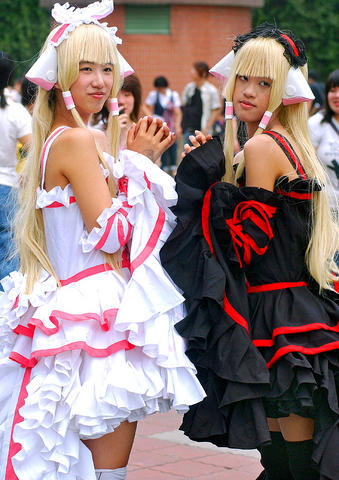Sporting a blue wig, an eye patch and a white lace gown embellished with a pair of wings, 15-year-old Candice Chen looks ready to hit a costume party.
She is among a growing number of Taiwanese youth who call themselves "cosers" and follow a fashion that aims to combine costume and roleplay based on characterizations in Japanese animation, or "manga."
As the fashion catches on across Taiwan, experts have said that it could help young people break out of the strictures forced on them by the traditional Chinese pressure to conform.

PHOTO: AFP
Since "cosplay" first hit Taiwan a little over a decade ago, its enthusiasts have been dressing up like their favorite manga characters and gathering at cafes, parks and manga expos across the nation.
"I started reading Japanese manga in elementary school. I like characters in action and adventure stories and want to be like them," said Chen, describing the role she portrays as "spirited and sportive."
In Taipei where large-scale manga expos are held several times a year at stadiums and conference centers, hundreds of cosplayers gather to show off their flamboyant outfits and accessories.
At a recent expo at National Taiwan University's stadium, cosers were seen portraying a wide variety of roles from princesses to maids, space warriors, martial arts masters and even Death.
"Cosplay helps me release pressure from studies and boost my self-confidence," said a 19-year-old coser who asked to be identified only by her nickname "Dawn."
Lawmaker Cheng Yun-peng (
"Taiwan's education does not encourage students to express themselves, to stand out or face the public. Young cosers who dare to do so might achieve more than their shy peers," he said. "We should not look down on cosplay as a teenage subculture. I don't see why adults can't do cosplay to relive their childhood dreams. It can become a family recreation."
Huang Chen-yuan (
"Cosplay can be a form of art for teenagers who seek to demonstrate their ideas, creativities and even a sense of fashion through designing," said Huang.
The appeal of cosplay appears to be spreading beyond youth.
Former president Lee Teng-hui (
"The popularity of cosplay shows that Taiwan's society is more diverse and less suppressed as time changes. Cosplay would have been deemed as corrupting morals decades ago," said Huang.
In Taiwan, role-playing dates back to around 1995 but has been gaining in popularity in recent years largely thanks to the Internet, said Mio Chang, supervising editor of bi-monthly cosplay magazine Cosmore.
"Cosers admire the `manga' or `anime' characters and want to imitate them. It is a passion for them to recreate the looks, the costumes and props," said Chang, herself a coser for many years. "It is similar to worshipping heroes. It's like when we were little we tied a sheet around our neck like a cape and pretended to be Superman saving the world."
Most of Cosmore's readership are high school girls, who also make up the bulk of cosers, said Chang.
The business potential of a niche cosers market appears promising with new cafes, tailor shops and props stores opening up to cater for the growing number of cosers.

Chinese spouse and influencer Guan Guan’s (關關) residency permit has been revoked for repeatedly posting pro-China videos that threaten national security, the National Immigration Agency confirmed today. Guan Guan has said many controversial statements in her videos posted to Douyin (抖音), including “the red flag will soon be painted all over Taiwan” and “Taiwan is an inseparable part of China,” and expressing hope for expedited reunification. The agency last year received multiple reports alleging that Guan Guan had advocated for armed reunification. After verifying the reports, the agency last month issued a notice requiring her to appear and explain her actions. Guan

The Kaohsiung Tourism Bureau audited six hotels in an effort to prevent price gouging ahead of Korean band BTS’ concert tour in the city scheduled for Nov. 19, 21 and 22 this year. The bureau on Friday said that the audits — conducted in response to allegations of unfair pricing posted on social media — found no wrongdoing. These establishments included the local branches of Chateau de Chine, Hotel Nikko, My Humble House, and Grand Hai Lai, it said, adding that the Consumer Protection Commission would have penalized price gougers had the accusations been substantiated. The bureau said the Tourism Development Act

GIVE AND TAKE: Blood demand continues to rise each year, while fewer young donors are available due to the nation’s falling birthrate, a doctor said Blood donors can redeem points earned from donations to obtain limited edition Formosan black bear travel mugs, the Kaohsiung Blood Center said yesterday, as it announced a goal of stocking 20,000 units of blood prior to the Lunar New Year. The last month of the lunar year is National Blood Donation Month, when local centers seek to stockpile blood for use during the Lunar New Year holiday. The blood demand in southern Taiwan — including Tainan and Kaohsiung, as well as Chiayi, Pingtung, Penghu and Taitung counties — is about 2,000 units per day, the center said. The donation campaign aims to boost

BACK TO WINTER: A strong continental cold air mass would move south on Tuesday next week, bringing colder temperatures to northern and central Taiwan A tropical depression east of the Philippines could soon be upgraded to be the first tropical storm of this year, the Central Weather Administration (CWA) said yesterday, adding that the next cold air mass is forecast to arrive on Monday next week. CWA forecaster Cheng Jie-ren (鄭傑仁) said the first tropical depression of this year is over waters east of the Philippines, about 1,867km southeast of Oluanpi (鵝鑾鼻), and could strengthen into Tropical Storm Nokaen by early today. The system is moving slowly from northwest to north, and is expected to remain east of the Philippines with little chance of affecting Taiwan,